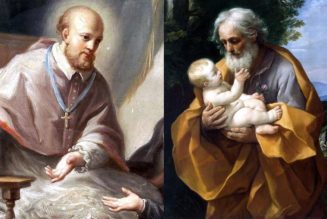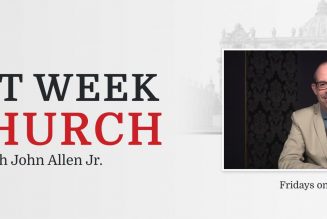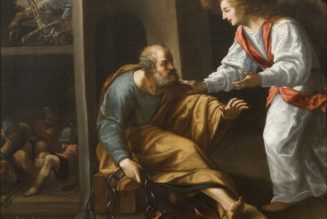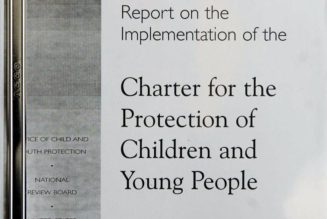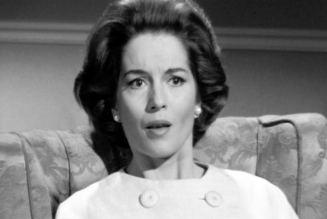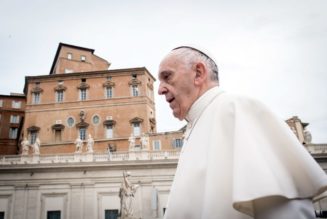, April 22, 2021

Be careful not to ask the wrong question this Sunday, Good Shepherd Sunday, the Fourth Sunday of Easter Year B.
Jesus says he is “the good shepherd, who lays down his life for his sheep,” while “a hired man, who is not a shepherd and whose sheep are not his own, sees a wolf coming and leaves the sheep and runs away.”
Catholics might be tempted to ask, “Would our shepherds today lay down their lives for their flock?”
But the question we should be asking is this: “Do I lay down my life for others? Or do I spend energy judging those it is not my responsibility to judge?”
After all, the good shepherd is the judge. Not me.
Immediately before Jesus spoke of the good shepherd in Sunday’s passage from the Gospel of John, he healed the man born blind, and the Pharisees asked, “Are we also blind?” Then, immediately after the Good Shepherd Discourse, the Jewish leaders say, “He is possessed; he is out of his mind; why listen to him?”
Why would Jesus answer their question about the man born blind with his description of the good shepherd? And why would they say that his description makes him sound like he is possessed by the devil?
His words offended his Jewish audience because they knew the shepherd prophesies of the Book of Ezekiel. They could tell that Jesus was comparing them to the shepherds who “pastured themselves and did not pasture my sheep,” leaving their sheep to “become food for wild beasts.”
They would also know that God himself was the good shepherd in Ezekiel — the one who said not only, “The lost I will search out, the strays I will bring back, the injured I will bind up, and the sick I will heal” — but also “I am coming against those shepherds” and “I will judge between one sheep and another, between rams and goats.”
In other words, when the Jewish leaders questioned Jesus for healing the man born blind, he told them, “I came into this world for judgment” and then proceeded to identify himself with the Ultimate Judge, depicted as the good shepherd in Ezekiel.
No wonder they called him “possessed.” He was either possessed or he was God himself, and they were not willing to admit that.
But Jesus didn’t only come to judge. He also came to gather.
God has been very consistently laying out his plan for us.
First, in Ezekiel, the good shepherd says he will bring other nations into the same flock as his chosen people, the Jews:
“I will lead them out from among the peoples and gather them from the lands; I will bring them back to their own country and pasture them upon the mountains of Israel.”
Then Jesus came putting the Jewish leaders on notice that there is a universal flock now. He explains:
“I have other sheep that do not belong to this fold. These also I must lead, and they will hear my voice, and there will be one flock, one shepherd.”
Third, in the First Reading, we see the early Church identifying itself as that one flock. St. Peter himself has been arrested and tells the Jewish leaders that the ancient prophecies are coming true before their eyes in Jesus Christ:
“There is no salvation through anyone else, nor is there any other name under heaven given to the human race by which we are to be saved.”
And this Sunday we Mass-going Catholics are the next step in the process. We will each echo Ezekiel, Jesus, and Peter, confessing in the creed, “I believe in one, holy, Catholic and apostolic Church,” that is, the one flock, made holy by its founder, the universal (“catholic”) flock that follows in the line of the apostles — the one Church built on St. Peter.
Then, at Mass, we will actually unite ourselves with the body, soul, and divinity of the good shepherd. As St. Gregory the Great put it, “The good shepherd has laid down his life for his sheep in order to change his body and blood into a sacrament for us and to satisfy the sheep he had redeemed with his own body as food.”
After that, he says, “the mold that is to form us is there. The first thing we are to do is to devote our external goods to his sheep in [the works of] mercy. Then, if it is necessary, we are to offer even our death for those same sheep.”
So that’s it: The mold and the form is there. What does it require we do?
For Peter it meant getting arrested for healing a crippled man, then preaching the Gospel to his captors. For us it will mean healing the materially, emotionally, or spiritually crippled around us — and doing it at a cost, since “there is another wolf that ceaselessly, every day, tears apart minds [and souls], not bodies,” as St. Gregory puts it.
When the wolf comes — the empty lies and vicious values of the world — it is our job to fight for our vulnerable friends and families, to the death.
We are hirelings if we look out for ourselves instead — our material goods but also our own personal political or moral agendas — more than the sheep. To be concrete: If the wolves of loneliness, hopelessness, and faithlessness are attacking my family and friends, and I spend my time posting about politics and complaining about the failings of Church leaders or over-indulging my bad habits, I am acting like a hireling who doesn’t care about the sheep as much as I care about myself.
And we know from Matthew, Chapter 25, what else the good shepherd will do.
“When the Son of Man comes in his glory” and assembles the nations, it says, “he will separate them one from another, as a shepherd separates the sheep from the goats.” Those who ignored his sheep “will go off to eternal punishment, but the righteous to eternal life.”
In the Second Reading, John describes what we can look forward to if we are in the group that gets eternal life.
“Beloved, we are God’s children now; what we shall be has not yet been revealed,” he writes. “We do know that when it is revealed we shall be like him, for we shall see him as he is.”
The more time we spend actually helping in the situations we can change — instead of worrying and complaining about what we can’t change — the more we will find ourselves changed by the mold of Jesus into the glory of Christ.
Tags: Fourth Sunday of Easter Year B, Good Shepherd Sunday Year B, prayer, Sunday Gospel, Sunday Readings
Never miss a post! Subscribe below to our weekly newsletter.
Related
Join Our Telegram Group : Salvation & Prosperity

